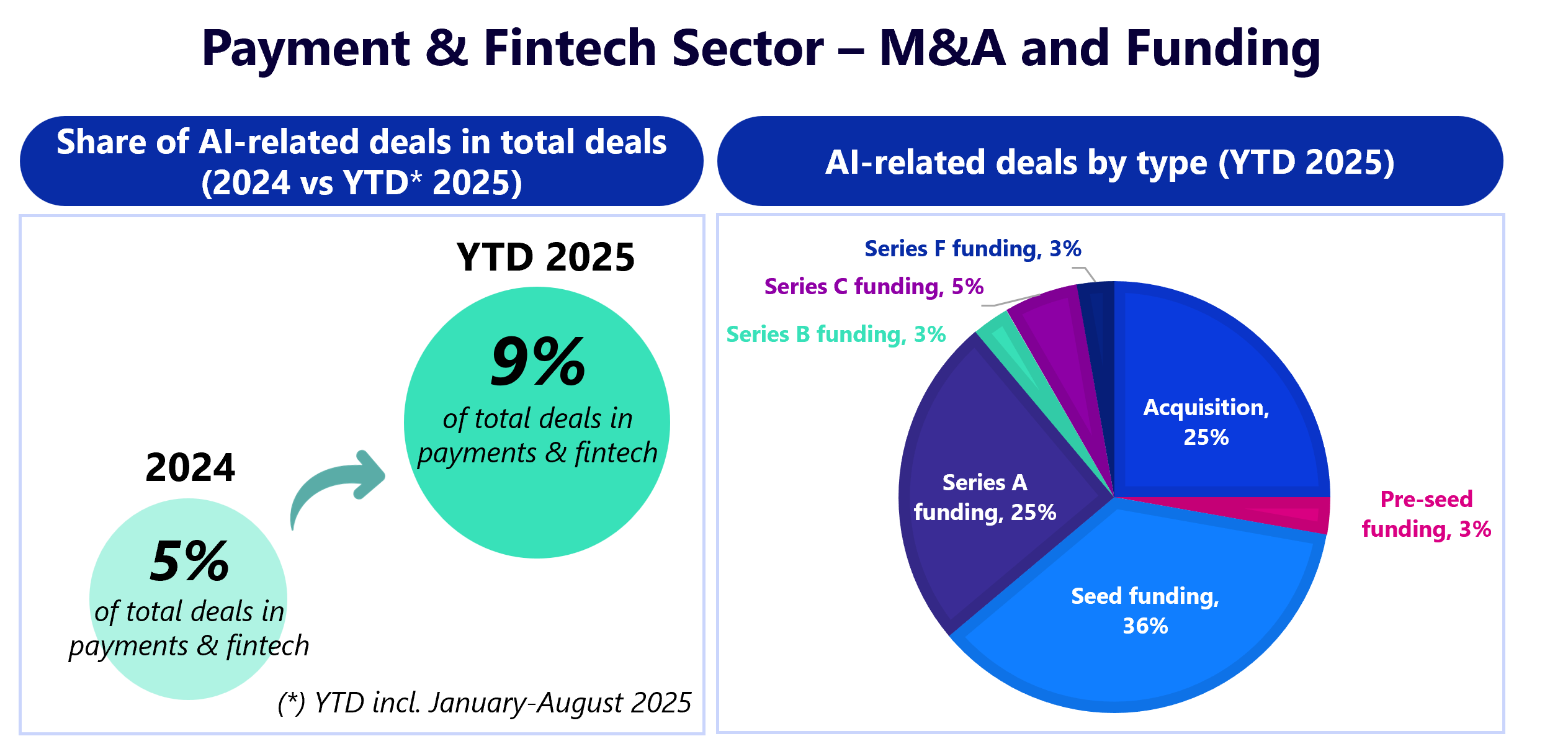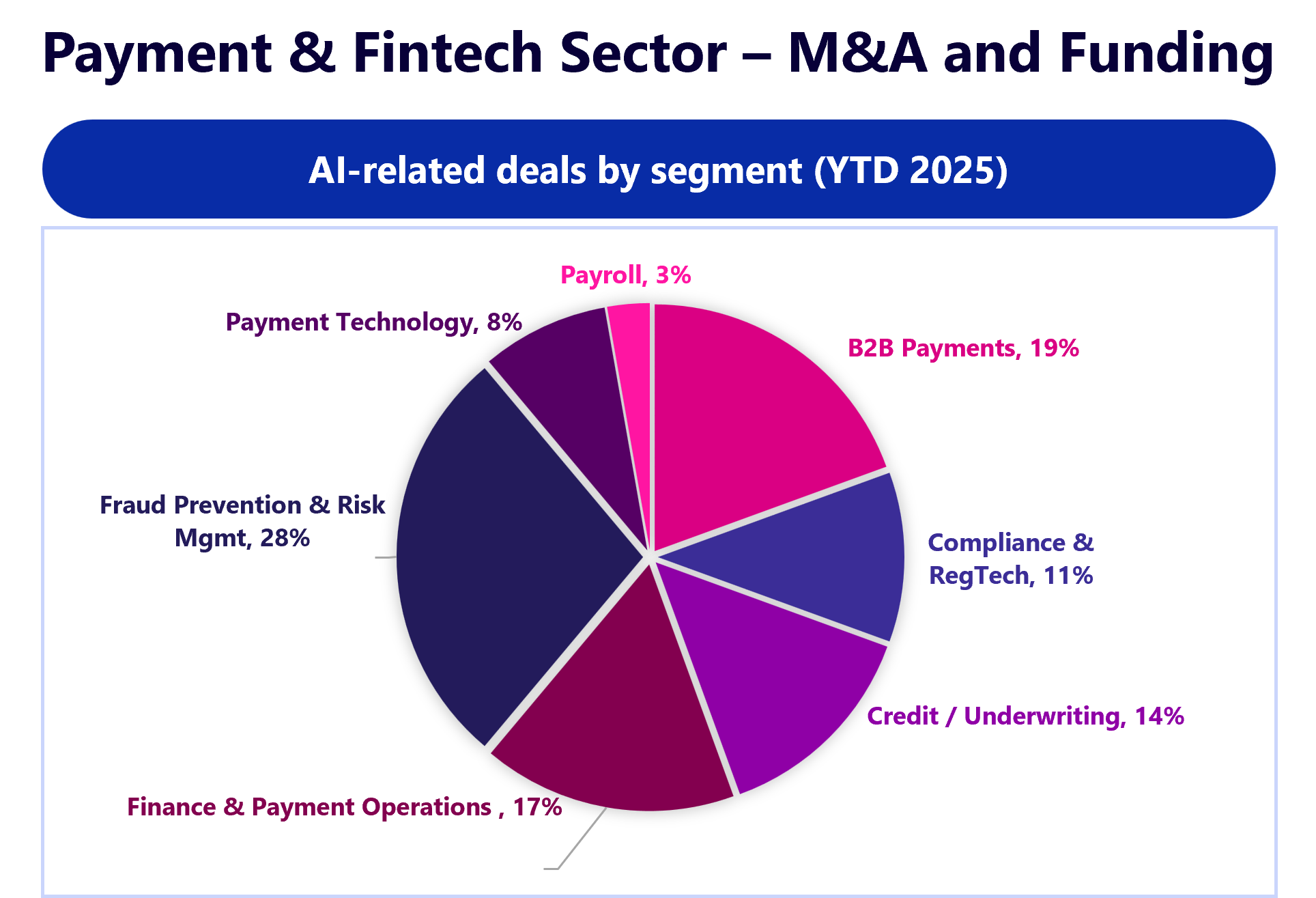Artificial intelligence is transforming industries worldwide, powering new waves of innovation across sectors as diverse as healthcare, logistics, finance and beyond. It is fundamentally reshaping how businesses operate through automation, advanced analytics, and hyper-personalized experiences. Unsurprisingly, global investment in AI has surged to record levels in 2025, underscoring sustained investor confidence. In the U.S. alone, AI accounted for 64% of total deal value in H1 2025, with AI-related transactions representing 36% of all VC activity, a trend mirrored across other major markets.
Even in the context of payments, artificial intelligence has evolved significantly over the past decade, transforming from a back-office optimization tool to a mission-critical strategic differentiator. With generative AI and intelligent agents entering day-to-day operations, industry players are reimagining what money management and digital payments can mean for people and businesses alike. To understand how this shift is translating into real market activity, we analysed where AI investments are flowing within the ecosystem.
Tracking the investments in payment and fintech
At Edgar, Dunn & Company, we have been tracking M&A transactions across the payments and fintech ecosystem. In 2024, we recorded 630 deals in the sector, with roughly 5% demonstrating AI related focus. By August 2025, this share had nearly doubled - of more than 420 deals logged year-to-date (YTD), around 9% center on AI capability investments or acquisitions.

More than just market enthusiasm, this represents strategic intent as companies build, buy, and bet their competitive futures on AI capabilities. YTD 2025 data shows that most of these deals are occurring in the USA and that Seed and Series A rounds represent over 60% of AI-related deal activity. This concentration in early-stage funding rounds highlights that AI in payments remains in a formative growth phase, with strong investor confidence driving early bets.
Acquisitions account for 25% of AI-related activity, underscoring that leading payment companies increasingly view AI as mission-critical. Rather than relying solely on in-house development, these firms are prioritizing acquisitions to accelerate speed-to-market and gain access to proven, specialized capabilities. Recent deals highlight this trend: Worldpay acquired Ravelin to enhance AI-driven fraud prevention; Incode bought AuthenticID to strengthen its AI-powered identity verification suite; and Tipalti acquired Statement to advance AI-based treasury and cash flow automation. Collectively, these moves signal a shift towards inorganic growth as the fast path to embedding advanced AI solutions across scalable, intelligent payment ecosystems gained momentum.
Where is the capital flowing in 2025?

As shown in the chart above, the YTD 2025 AI-related deals by segment distribution reveals concentrated investment across few core payment domains:
- Fraud prevention & risk management: This segment commands the largest share of deals (28%), representing the most critical battleground in payments. With transaction volumes surging and criminals leveraging sophisticated generative AI techniques, from deepfakes to social engineering, traditional rule-based systems are proving increasingly inadequate at scale. The investment activities in this segment spans across both AI-native solutions seeking growth capital and established fraud management tools adding AI capabilities to enhance their offering. For instance, US startup Sardine, who secured $70 million in Series C funding in February 2025, is developing AI agents to augment human risk teams - ranging from KYC agents and payment screening agents to merchant risk and dispute management agents. Casap is a similar company who got $25 million funding in August to enhance its first-party fraud scoring, AI decisioning, and expand capabilities across the payments lifecycle. Other notable fund raises include Quantexa ($175 million) and Hawk AI ($56 million) in the quest to fight money laundering and complex financial crime. All these investments highlight a fundamental industry shift: AI is transforming risk management from static rule-based systems to dynamic, self-learning frameworks capable of countering new and sophisticated threats in real time.
- B2B payments: B2B payment processes and workflows are undergoing an operational revolution driven by AI, particularly across spend management, expense management, accounts payable/accounts receivable (AP/AR), and treasury. AI is eliminating delays, reducing errors, and transforming traditional cost centers into strategic assets. The AP automation segment alone has seen significant investment with over three notable deals. The industry is moving beyond basic automation toward agentic AI systems capable of executing multi-step, autonomous workflows without human intervention. For instance, Xelix raised $160 million in Series B funding from Insight Partners in July for its agentic AP automation platform, embedding AI throughout the workflow to manage invoices, emails, reconcile statements, and generate responses. In the area of expense management, AI-powered solutions such as Alaan and Circula secured Series A funding of $48 million and $15 million, respectively.
- Payment technology infrastructure: While currently representing a smaller share of overall investment, payment infrastructure may be the most strategically significant category for long-term competitive positioning. A growing wave of funding targets AI-native infrastructure, anticipating fundamental shifts toward agentic commerce. Catena Labs raised $18 million to build the first regulated, AI-native financial institution for the agent economy, including stablecoin-based payment rails with near-instant settlement and low fees. Similarly, Nevermined secured $4 million in January to develop a platform enabling AI agents to discover, negotiate, and transact with each other in real time. And US fintech Lava raised $5.8 million to create a single wallet solution with usage credits, allowing AI agents to execute autonomous transactions seamlessly.
Beyond core payment functions, substantial AI investment is also flowing into adjacent fintech domains. Finance & Payment Operations (17%) is leveraging AI for personalization, sales enablement, and customer service optimization. Compliance & RegTech (11%) focuses on tackling regulatory complexity through automated reporting and real-time monitoring. Meanwhile, Credit & Underwriting (14%) uses AI to enhance risk assessment, streamline loan origination, and improve decision accuracy.
Agentic AI in the Limelight
While these investment patterns reveal where capital is flowing, they also illuminate a deeper transformation occurring across all payment domains: the emergence of truly autonomous AI systems. Some of the companies securing the largest funding rounds (e.g., Xelix, Sardine, Catena labs) represent more than incremental improvements to existing processes. They signal the industry's transition toward agentic AI. AI has evolved from predictive AI, which forecast outcomes based on historical data, to generative AI, which create content or insights, and now to agentic AI - autonomous systems capable of performing multi-step tasks with minimal human intervention. The rise of AI agents is redefining possibilities in online commerce, creating demand for financial infrastructure specifically designed for autonomous systems. At Edgar, Dunn & Company, we are closely monitoring this space internally and have recently published an article on its implications for the payments ecosystem players. Major payment networks are responding to this trend investing into dedicated internal initiatives. Visa's Intelligent Commerce allows companies to integrate Visa’s AI capabilities securely, enabling AI agents embedded in platforms such as chat apps or virtual assistants to complete purchases. Mastercard rolled out Agent Pay, a secure infrastructure for agentic payments, with deep investment in tokenization and machine-to-machine payment protocols. These developments signal recognition that the next wave of payment volume will come from agent-to-agent transactions. Even established players like Stripe and PayPal have begun enabling agent-initiated payments, though current implementations primarily involve AI agents generating payment links for human customers, a stepping stone toward fully autonomous commercial interactions. This shift toward agent-driven commerce will attract significant infrastructure investment, as companies build the foundational capabilities needed for AI agents to conduct business independently from opening accounts and managing compliance to executing complex multi-party transactions.
Market outlook and closing thoughts
The investment patterns we've analyzed point to structural shifts in the competitive dynamics in payments rather than a passing wave of market excitement. The concentration of AI investment in core payment functions like fraud prevention, B2B operations, and infrastructure indicates strategic recognition that AI capabilities are becoming essential for competitive survival, not optional enhancements. The heavy weighting toward early-stage funding suggests continued innovation and fragmentation, creating ongoing M&A opportunities as solutions mature and consolidate.
For strategic buyers and investors, the current landscape offers acquisition opportunities before AI-focused payment companies reach full valuation maturity. The emphasis should be on acquiring capabilities over scale, targeting companies with proven operational impact in autonomous decision-making, multi-step workflow execution, and adaptive risk management. The market reality is increasingly clear: companies that can seamlessly integrate AI through strategic acquisitions will establish sustainable competitive advantages in speed, accuracy, and operational efficiency.
For fintech companies and AI startups, strong strategic appetite for autonomous AI solutions creates premium valuation opportunities, particularly for companies with demonstrated agentic capabilities rather than traditional automation. Value maximization lies in articulating measurable operational impact and defensible competitive positioning through proprietary algorithms, exclusive data partnerships, or proven autonomous workflow implementations.
The strategic imperative facing payment industry participants has evolved from whether AI will impact payments to how quickly companies can leverage organic development or strategic acquisitions to build the autonomous capabilities that will define future competitive positioning. As agent-driven commerce scales and autonomous systems become the primary drivers of transaction volume, companies that recognize this shift early and align their strategies around agentic AI transformation will capture disproportionate value in an intelligence-driven market.
The content of this article does not reflect the official opinion of Edgar, Dunn & Company. The information and views expressed in this publication belong solely to the author(s).
Rohan is a Consultant in the Paris office. Before joining EDC, Rohan worked 3 years in India and France across technology strategy and transformation projects. Since joining EDC in 2023, he has gained valuable payment strategy expertise working with global card networks, issuers, fintech’s and travel merchants. Rohan holds a Masters in Management from ESSEC Business School in Paris, alongside an Electronics Engineering degree from India. Outside the realm of consultancy, Rohan follows cricket, football, and Formula 1. Additionally, he finds solace in activities like cooking, yoga and skateboarding.

%20(1).webp)

%20(1).webp)

.webp)


